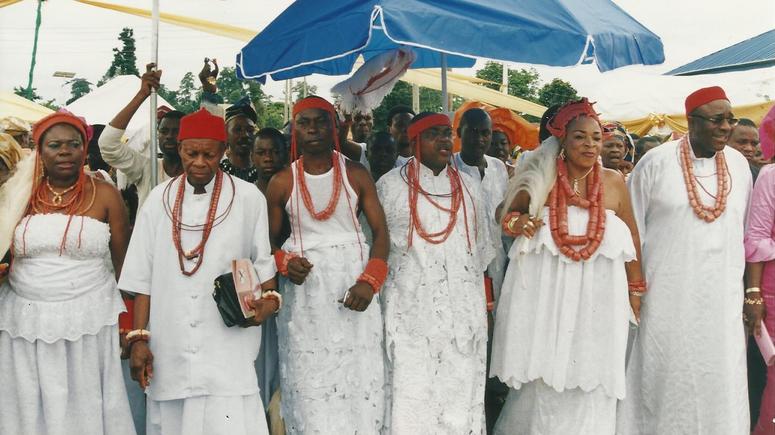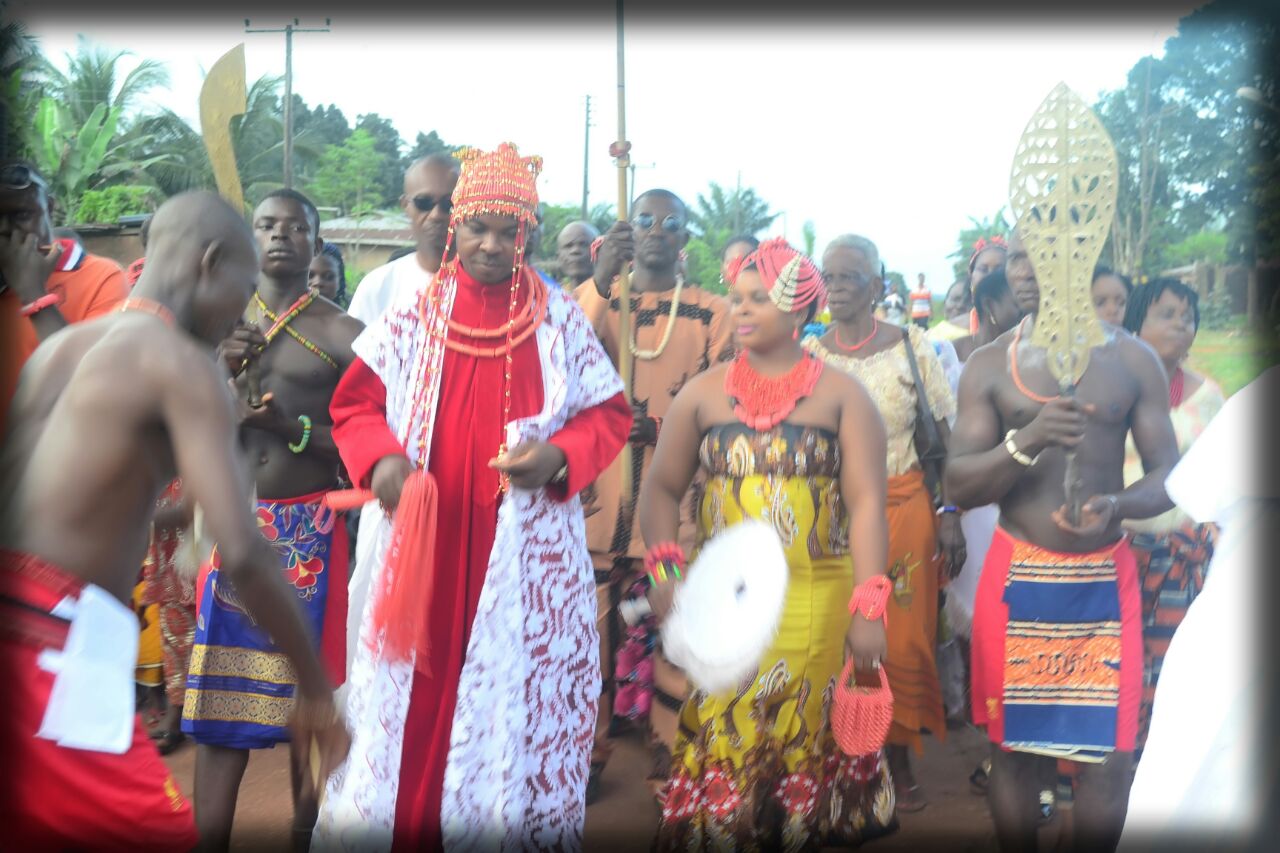Somehow the Igbo people of Southeast Nigeria seem to be scattered across the board and you will struggle to find any entity without a cluster of Igbo communities. While you must have been aware of indigenous Igbo communities in Rivers, Delta, and Akwa Ibom, you wouldn’t expect indigenous Igbos as far west as Edo State. Well, there is a fully functional Igbo community, the Igbanke people, in the heart of Edo State.
The Igbanke Igbo community in Edo State is something that is sometimes contested. They are located in the Orhionmwon Local Government Area of the state and people speak a dialect of the Igbo language, known as Ika whom disputers of their Igbo heritage say is not Igbo.
The Story Of The Igbanke People
Stories have it that for centuries the town is known today as Igbanke was formerly called Igbo-Akiri. In 1967, the then military head of Midwest State, Brigadier Samuel Ogbemudia changed the name from Igbo-Akiri to Igbanke due to fear of persecution owing to the succession of the Igbo people then.
How The Bini Used And Sold The Igbos As Slaves For Centuries – Reno Omokri Narrates
Now the question will be how did an Igbo settlement come to be in a place so far away from the central abode of the Igbos?
Igbanke settlements constitute the villages Omoluah, Obiogba, Idumuiru, Igbontor, Idumodin, Ake, Oligie and Ottah, these communities have different stories of how they came to be according to local myths.

According to the settlement stories, the Igbontor village which is considered the first to settle in Igbanke came to be through an illicit affair between one of the daughters of Oba Ozolua and a slave. Oba Ozolua was known to be a fierce warrior-king who conquered kingdoms.
During one mission to conquer a community called Oburo, the Oba set out with his warriors, slaves, and one of his daughters Uvbi. When the party came to a river crossing, the king asked his daughter to stay back and wait with one of his slaves while they head to battle.
As with most ancient wars, it took months, so much that by the time the warrior-king came back the daughter was already pregnant for the slave. This was a disgrace to the Oba, and to punish her, he left her at the place called Igbontor which birthed the village.
The legend didn’t say but the slave is probably Igbo.
The stories of how the other villages came to be are not as colourful as that of the people of Igbontor, especially the main Igbo community of Ottah.
Littered across history pages are stories of how Igbo people, most especially the Aro people, travelled far and wide during the early times, establishing settlements and expanding. This was how the people of Ottah in Igbanke settlement came to be. The Ottah people migrated from Ata in present-day Anambra State.
The other villages also migrated from different parts of the country including the people of Ake who migrated from Mbiri, an Igbo community in Delta State.
The people of Oligie were said to be direct descendants of a reigning Oba of Benin who migrated to the Igbanke settlement.
The Omolua village is made up of people from different places in Esan, Ika, and Benin who settled in the present-day Omolua.
From the Amahor present-day Igueben, an LGA in Edo State, the Idumodin people migrated to Igbanke.
This is how these villages came together to make up the Igbanke Igbo settlement in the present-day Edo State.
Representation of the Igbo Community
Wonder why you’ve never heard of the Igbo Community in Edo State? For a village that contrasts sharply amongst surrounding localities, the story of the Igbanke people is one that should be popular and well represented in Edo State but it is not so.
In fact, there seems to be a systematic motive to erase any trace of their Igbo lineage according to the people. This alleged erasure was believed to have started around the time of the bloody Nigerian civil war when the then military head changed the name of the settlement from Igbo-Akiri to Igbanke to sound more Bini.
At this point, it is important to note that there are other Igbo communities outside of Igbanke in Edo State.
The Ordeals of Igbanke people
Some time ago, an Igbanke indigene presented a paper titled the “What we go through as Igbos in Edo”. It was an impassioned plea at the same time an alarm to the ordeals of Igbanke people. Some of the ordeals he listed include:
1) Denial of basic government certificates like, “Certificate of Local Government of origin’’, Protest Letter’’, To Whom it May Concern’’ ,etc because of their Igbo names under the guise that they are not Bini. They are most times ridiculed and mocked because of their Ika ancestral names like, “Emeka”, “Maduka”, “Chukwuka’’, “Chinyere”, “Amaka and “Ogorchukwu, etc forcing them to drop their Igbo names for Bini names.
Power And Reach Of The Aros In Igboland
2) To show that it is not a coincidence that those with Igbo affiliations are persecuted, those that have Igbo names but can speak Bini language are not subjected to the same treatment as others that can not, in fact, they are more welcomed. This again shows that the linguistic and cultural heritage of the Igbo community in Edo is at stake.
3) Outstanding sons and daughters of the Igbanke people with titles in their language are ridiculed into using the translated Bini versions of their title. According to an example, a few years ago, one of Igbanke sons who addressed himself as “Chief Orike-Eze” in Oba of Benin palace was shamefully harassed, insulted, and forcefully forced, right in the palace to change the title to its Bini version. According to the palace, the title, “Orike-Eze” had its origin from Ika and Igbo nations.
4) General deliberations are often conducted in Bini language. It was also alleged that the discrimination transcends to their rights in contesting for public offices, after all, stories have it that Brigadier Samuel changed the name to Igbanke because he was ashamed that people will link him to Igbo ancestry as that was his place of origin.
One can not help but to wonder if the Igbo Community in Edo State is just underrepresented or is there a clandestine motive to balkanize their lineage and ancestry.
The people have organized various movements to change the name of the town back to “Igbo Akiri”, which is its true name. In addition, there is a group asking that they be merged with their brothers in Delta State.
Follow us on Facebook
Post Disclaimer
The opinions, beliefs and viewpoints expressed by the author and forum participants on this website do not necessarily reflect the opinions, beliefs and viewpoints of Anaedo Online or official policies of the Anaedo Online.

